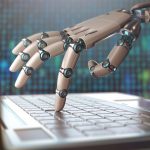Researchers from Google Health and Imperial College London have developed an AI model trained on 29,000 X-ray images to detect breast cancer.
The AI system outperformed six radiologists and showed comparable skill to two doctors in efficiently diagnosing breast cancer.
The Study
In a recent study in the journal Nature, an AI model was given anonymous images from Cancer Research UK’s mammogram database to detect breast cancer.
Compared to one radiologist, the model achieved a 1.2% reduction in false positives and a 2.7% in false negatives. Meaning the likelihood of misdiagnosing cancer or missing cancer altogether was reduced.
The model was able to achieve this despite having no access to the patient’s medical history or any other pre-existing data on the patient.
Dominic King from Google Health said: “Our team is really proud of these research findings, which suggest that we are on our way to developing a tool that can help clinicians spot breast cancer with greater accuracy.”
A Struggling System
Breast cancer is a major global health concern. In the UK alone, there are an average of 55,545 new cases each year.
This represents 15% of all cancer cases, making it the most common type of cancer.
Breast cancer cases have also increased by 24% in the past 23 years.
Although treatment methods have improved, cases continue to rise and there are damaging side effects to radiation therapy.
It can take over a decade for radiologists, pathologists and doctors combined to learn the skills necessary to detect breast cancer.
NHS hospitals were said to be operating with a shortage of 154,000 staff in 2023, with many on strike due to a lack of pay.
It looks as if AI systems could fill some of these gaps to help relieve stress for both staff and patients.
Advantages of AI Diagnostics
As shown in the study, AI tools could improve the accuracy of diagnosis and prediction of the progression of the disease.
AI could also help doctors determine the most effective treatment plan for each patient based on their specific characteristics.
This personalised approach could lead to more accurate treatment plans, more efficient use of resources and medicines and reduced side effects.
Furthermore, AI has the ability to analyse large amounts of data quickly, improving the efficiency of treatment and reducing waiting times for patients.
AI also never gets tired, would never need to take time off work and can work 24/7 if needed.
Could AI Replace Doctors?
Despite AI’s many advantages, it doesn’t look worthy of replacing humans anytime soon.
AI tools are only trained on data provided by humans. Therefore, a primary base of human research and knowledge is essential for them to work.
These systems therefore may be less accurate for some patients, particularly those with rare or unique characteristics, that may not be represented in the data used to train the algorithm.
The over-reliance on AI tools could also heavily compromise the importance of human intuition and expertise.
AI cannot currently have nuanced communications and conversations. Nor can it make spare-of-the-moment decisions or use its own initiative.
As it stands these are still incredibly important human attributes that are needed in healthcare.
Therefore, AI tools will be best used in conjunction with humans.
AI’s Impact on Healthcare
AI cancer detection is exciting. These findings reveal the potential for AI systems to improve diagnosis accuracy, save time, relieve pressure and stress on staff, improve quality of life for patients and reduce side effects of radiation treatment.
More research, investment, implementation and training are needed to build a transformative co-working relationship between doctors and AI.
But this could pave the way to a thriving future healthcare system, and ensure patients receive the best possible care.












